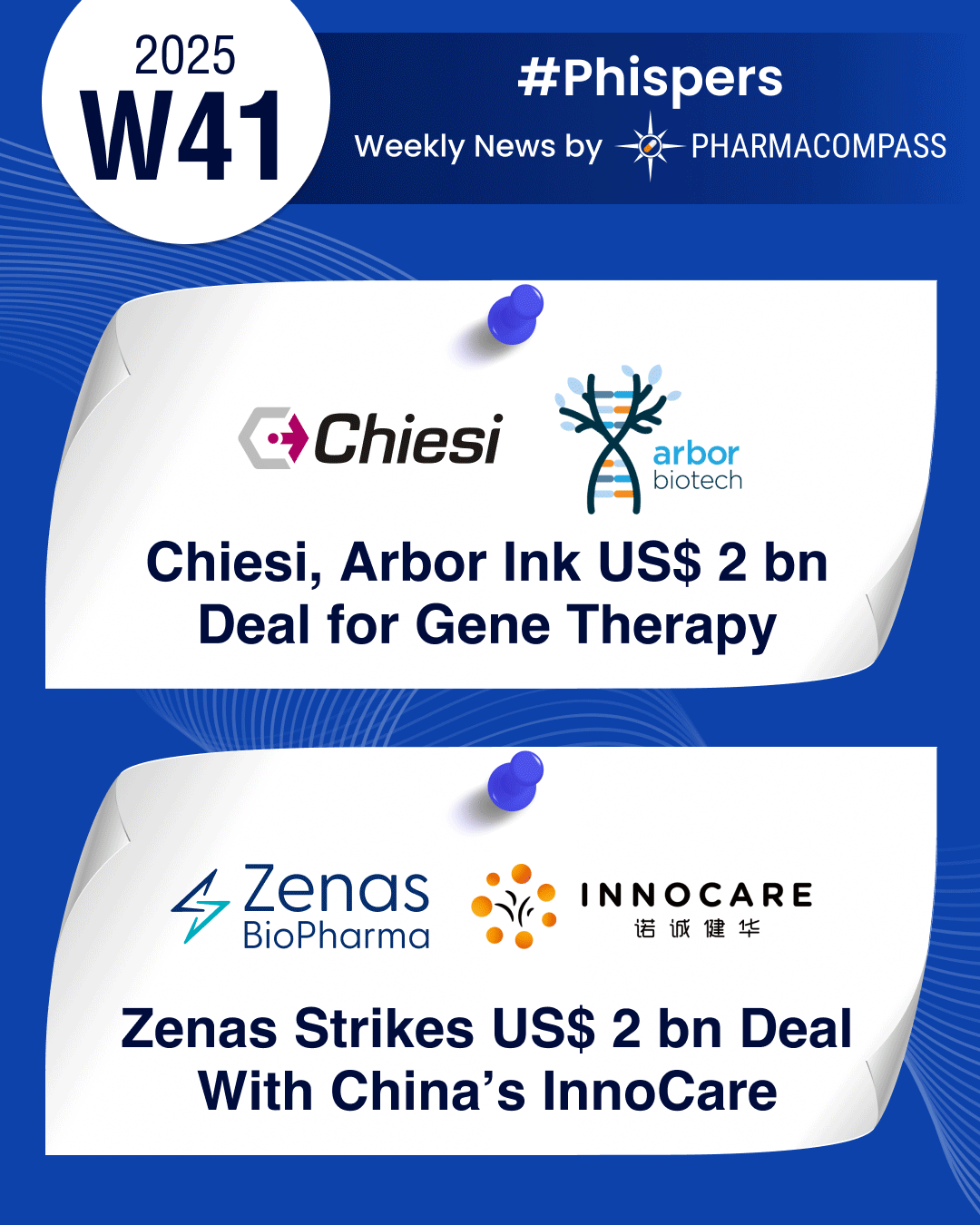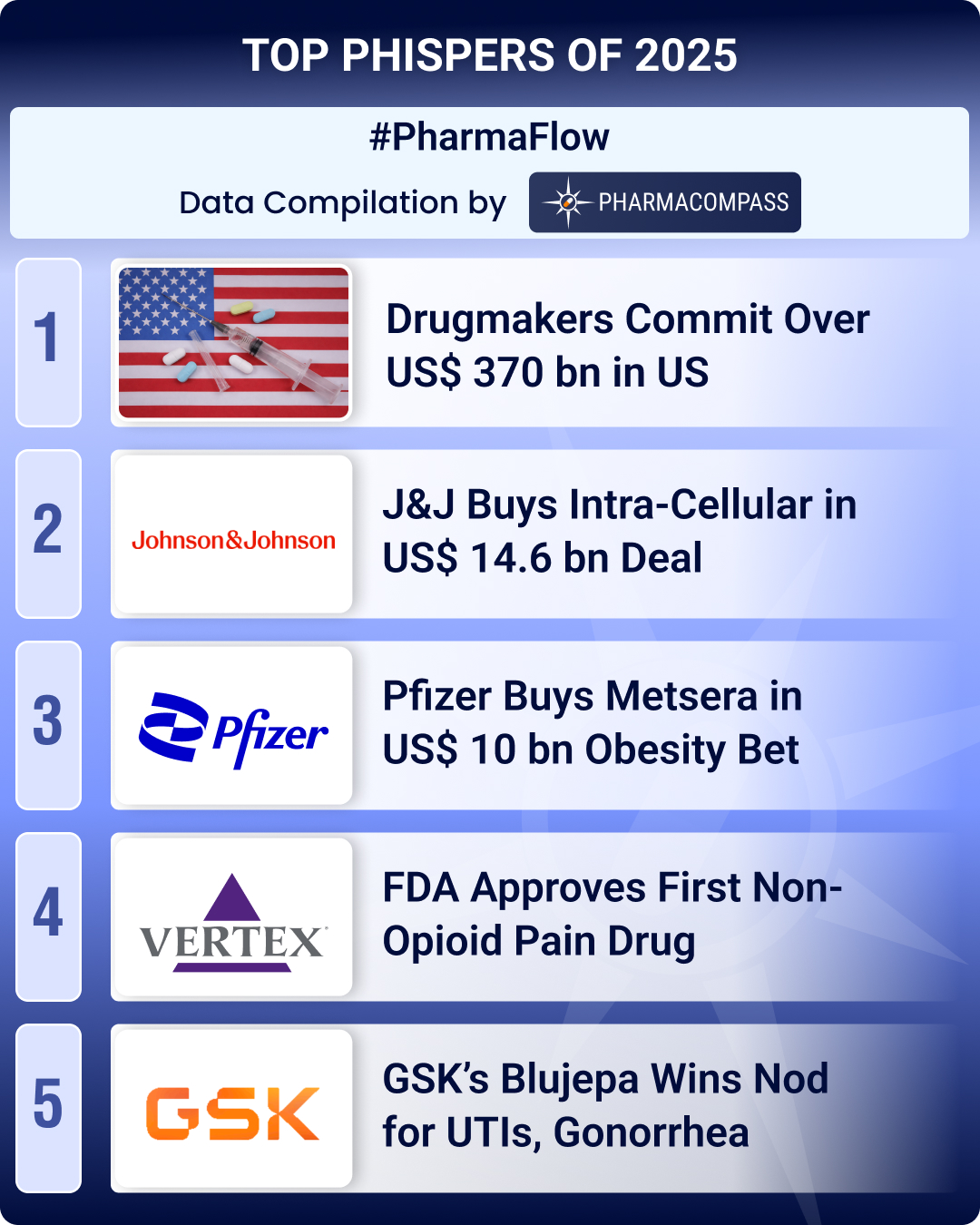
By PharmaCompass
2025-10-09
Impressions: 3,552 Article || 82 Video
In news this week, Italy’s Chiesi Group announced a deal worth up to US$ 2 billion with US-based Arbor Biotechnologies to advance a one-time gene therapy for an ultra-rare inherited kidney disorder. Massachusetts-based Zenas BioPharma also signed a deal worth over US$ 2 billion with China’s InnoCare Pharma to develop a new treatment for multiple sclerosis. And Eli Lilly announced an investment of over US$ 1 billion in India to expand drug manufacturing through local contract partners.
In drug approvals, the US Food and Drug Administration (FDA) has okayed Boehringer Ingelheim’s Jascayd (nerandomilast) for idiopathic pulmonary fibrosis (IPF) — a deadly lung disease that makes breathing increasingly difficult. The agency also approved a second generic version of the abortion pill mifepristone, cleared Jazz Pharmaceuticals and Roche’s drug combo for use as the first maintenance therapy for an aggressive type of lung cancer, and launched a pilot program to fast-track review of generics made entirely in the US. It also expanded the use of Regeneron’s Libtayo (cemiplimab-rwlc) to treat cutaneous squamous cell carcinoma (CSCC) — a common type of skin cancer.
Meanwhile, the owner of India’s Sresan Pharma, manufacturer of the toxic cough syrup that led to the deaths of at least 17 children, has been arrested.
And in news from clinical trials, AstraZeneca and Daiichi Sankyo’s breast cancer drug showed survival benefit over chemotherapy, while AstraZeneca’s new hypertension drug cut blood pressure in hard-to-treat patients.
Chiesi, Arbor ink US$ 2 bn gene therapy deal to treat rare kidney disease
Arbor Biotechnologies has signed a collaboration-cum-license agreement worth up to US$ 2 billion with Chiesi Group to advance its one-time liver-directed gene editing treatment for primary hyperoxaluria type 1 (PH1). PH1 is an ultra-rare inherited disorder that causes recurrent kidney stones and may lead to kidney failure. Current treatments — such as Alnylam’s Oxlumo (lumasiran) and Novo Nordisk’s Rivfloza (nedosiran) — require regular injections.
Zenas in US$ 2 bn deal with China’s InnoCare for its multiple sclerosis drug
Massachusetts-based Zenas BioPharma has signed a deal worth over US$ 2 billion with China’s InnoCare Pharma to develop orelabrutinib — a new treatment for multiple sclerosis (a chronic disease in which the immune system attacks the brain and spinal cord, leading to muscle weakness, vision problems, and difficulty in walking). This experimental oral drug aims to slow disease progression and disability, an area where current treatments fall short. The agreement also gives Zenas rights to develop two new autoimmune drug candidates that are expected to enter human trials next year.
Lilly to invest over US$ 1 bn in India to boost drug manufacturing
Eli Lilly will invest more than US$ 1 billion in India over the next few years to expand manufacturing and supply through local contract drugmakers. The American drugmaker aims to strengthen global production of key medicines for obesity, diabetes, Alzheimer’s disease, cancer, and autoimmune diseases.
Meanwhile, Peter Marks, former head of the FDA’s Center for Biologics Evaluation and Research (CBER), has joined Lilly as senior vice president of molecule discovery and head of infectious diseases. Marks resigned from the FDA earlier this year after clashing with the US Health Secretary Robert F Kennedy Jr's team.
FDA clears Boehringer’s med for idiopathic pulmonary fibrosis
FDA has approved Boehringer Ingelheim’s Jascayd (nerandomilast) for treating idiopathic pulmonary fibrosis (IPF) — a rare and deadly lung disease that makes breathing increasingly difficult. The twice-daily oral pill is the first new IPF therapy approved in over a decade. Boehringer said it will make Jascayd available “within days” and has also filed for approvals in Europe, China, and Japan.
Expands use of Regeneron’s Libtayo: FDA has approved Libtayo (cemiplimab-rwlc), Regeneron’s immunotherapy infusion for treating adults with cutaneous squamous cell carcinoma (CSCC) — a common type of skin cancer that can return even after surgery and radiation. The treatment is the first immunotherapy approved to prevent a relapse in high-risk patients. Libtayo is already approved in the US for various kinds of cancer.
FDA okays Jazz-Roche’s drug combo as maintenance therapy in lung cancer
FDA has approved Jazz Pharmaceuticals’ Zepzelca (lurbinectedin) in combination with Roche’s Tecentriq (atezolizumab) as a maintenance therapy for adults with extensive-stage small cell lung cancer (ES-SCLC) whose disease has not worsened after initial chemotherapy. ES-SCLC is an aggressive form of lung cancer that can rapidly spread to different parts of the body. This is the first approved combination for first-line maintenance in ES-SCLC. Zepzelca is already cleared as a second-line treatment for ES-SCLC.
Okays second mifepristone generic: FDA has approved a second generic version of mifepristone, a pill used along with misoprostol to end early pregnancies. The new generic is manufactured by Evita Solutions. The approval comes less than two weeks after RFK Jr told Republican state attorneys general in a letter that the FDA would review mifepristone’s safety. The drug approval has been condemned by anti-abortion groups.
Pilot program for US-made generics: FDA has launched a pilot program to speed up the review of generic drugs that are entirely made and tested in the US. The initiative aims to attract investment in domestic drug manufacturing.
AstraZeneca-Daiichi’s Datroway shows promise in aggressive breast cancer
AstraZeneca and Daiichi Sankyo’s Datroway (datopotamab deruxtecan) has become the first drug to show a significant overall survival benefit compared to chemotherapy in metastatic triple-negative breast cancer (TNBC) patients who cannot receive immunotherapy. In the phase 3 trial, Datroway also improved progression-free survival. TNBC is an aggressive type of breast cancer that often affects younger women.
Baxdrostat shows gain in phase 3 trial: AstraZeneca’s experimental drug baxdrostat significantly lowered blood pressure in patients with treatment-resistant hypertension in a late-stage trial. AstraZeneca plans to seek regulatory approval by the end of the year.
Owner of India’s Sresan Pharma arrested in toxic cough syrup case
G. Ranganathan, owner of India’s Sresan Pharma that was manufacturing Coldrif cough syrup containing diethylene glycol, has been arrested in Chennai. Tests found the syrup contained 46.28 percent diethylene glycol, against the permissible limit of 0.1 percent. The toxic cough syrup led to the deaths of at least 17 children in the Indian state of Madhya Pradesh. India’s health ministry said the contaminated batch was sold only domestically. However, the World Health Organization has urged caution, and has said it is possible that some exports took place unofficially.
The PharmaCompass Newsletter – Sign Up, Stay Ahead
Feedback, help us to improve. Click here
Image Credit : Phispers Infographic by PharmaCompass license under CC BY 2.0
“ The article is based on the information available in public and which the author believes to be true. The author is not disseminating any information, which the author believes or knows, is confidential or in conflict with the privacy of any person. The views expressed or information supplied through this article is mere opinion and observation of the author. The author does not intend to defame, insult or, cause loss or damage to anyone, in any manner, through this article.”







